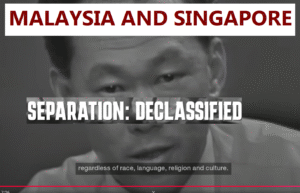Almost eight years ago, after the Myanmar military’s genocidal attacks against Rohingya communities in Rakhine State, the whole region was cut off from the world. No one was allowed in or out.
Back then, I was based in Yangon, a privileged Yangonite who was glued to social media and heavily influenced by government propaganda. I genuinely believed the narrative that “non-citizen extremists” were to blame, that they were the ones destabilizing the country.
At the time, a few days after the attacks, I was given the rare and heavy chance to witness the aftermath firsthand. The only way in was by air, so I boarded a helicopter with others, flying north from Sittwe City, Rakhine State.
As we lifted from Sittwe, I could still see the blue sea, green fields, and lively hills. But the further north we flew, the more the colors drained away. Soon, there was only grey. Entire villages were fields of ashes, ashes that reached nearly the tops of coconut trees. It wasn’t just one or two sites. It was village after village, lifeless and everything was burned to nothing.
I got to visit a place, where I saw hundreds, perhaps thousands, of Rohingya people stranded on the beach, their tents were scattered across the sand. They were waiting, hoping, to cross the dangerous waters to Bangladesh. I remember standing in the middle, on one side was the vast, empty sea stretching endlessly, and the other side was fragile tents and people’s eyes filled with fear, grief, and exhaustion.
I will never forget one woman I met. I don’t know her name, we didn’t speak the same language. But when she saw me standing under the blistering sun, she smiled and invited me into her tent. In the middle of her suffering, after everything she had already endured and all the horrors that still lay ahead, she still showed me kindness. That moment broke me.
On the way back, I kept asking myself …
How is it possible that millions of people burn down their own homes just to risk their lives crossing a deadly sea? How could anyone believe that propaganda and blamed them? How could generations of families who had lived in this land be denied citizenship simply because of their existence? Why should mothers, fathers, children, even newborns, be forced to die simply because they are Rohingya? If this isn’t genocide, then what is? If this isn’t the worst of humanity, then what is?
That day changed me forever. I promised myself I would never again turn away from the truth, not for politics, not for convenience. History is full of examples where people once seen as guilty turned out to be innocent, and those once thought innocent were later revealed as perpetrators. Time shifts, narratives shift. But what should never shift is our moral compass: our refusal to let racism, discrimination, and violence blind us.
Even today, I see people deny that the Rohingya genocide ever happened. I see racism against them and other ethnic minorities just for political gain.
I humbly pray, no matter how heavy the truth is, we never shut our eyes or ears to it.
Hla Y. Eain
လွန်ခဲ့တဲ့ ၈ နှစ်ခန့်လောက်က မြန်မာစစ်တပ်က ရခိုင်ပြည်နယ်မှာရှိတဲ့ ရိုဟင်ဂျာတွေကို လူမျိုးတုံးသတ်ဖြတ်မှုတွေလုပ်ပြီးတဲ့အချိန်ပေါ့ … အဲ့တုန်းက မှတ်မှတ်ရရ တပြည်နယ်လုံးကို ကမ္ဘာကြီးကနေ အဆက်အသွယ်ဖြတ်ချခဲ့တဲ့အချိန် … အကုန်ပိတ်ဆို့ထားပြီး ဘယ်သူမှ အဝင်အထွက်လုပ်လို့မရခဲ့ဘူး..
ကိုယ်ကအဲ့တုန်းက ရန်ကုန်အခြေစိုက် အခွင့်ထူးခံလေးပေါ့ … ဆိုရှယ်မီဒီယာတွေမှာ အဲ့တုန်းကအစိုးရရဲ့ ဝါဒတွေကောင်းကောင်းမိခဲ့ပြီးတော့ “နိုင်ငံသားမဟုတ်တဲ့ အစွန်းရောက်”တွေက တိုင်းပြည်ကို မငြိမ်မသက်ဖြစ်အောင် လုပ်ကြံဖန်တီးပြီးတော့ ဖျက်လိုဖျက်စီးလုပ်နေကြတယ်ဆိုပြီး ယူဆခဲ့တဲ့သူပေါ့။
အကြမ်းဖက်မှုတွေဖြစ်ပြီး ရက်အနည်းငယ်ကြာတော့ အရမ်းကိုရှားပါးတဲ့အခွင့်အရေးတစ်ခုရခဲ့တယ်။ အဲ့တုန်းကအလုပ်လုပ်ခဲ့တဲ့ အဖွဲ့အစည်းနဲ့ မြေပြင်ကိုသွားရောက်ခွင့်ရခဲ့တယ်။ ရေလမ်း ကုန်းလမ်းက သွားဖို့ဘယ်လိုမှ အဆင်မပြေတော့ လေကြောင်းလမ်းနဲ့သွားခဲ့ကြတယ်၊ ဆိုတော့ ရဟတ်ယာဥ်နဲ့ စစ်တွေမြို့ကနေပြီးတော့ ဟိုး ရခိုင်ပြည်နယ်အစွန် တောင်ပြိုလက်ဝဲထိကို သွားခဲ့တယ်။
အဲ့လိုနဲ့ စစ်တွေမြို့ကနေ စပြီးကောင်းကင်ပေါ်တတ်တော့ အော်လှလိုက်တာ ပင်လယ်ပြာတွေ၊ တောတောင်တွေ စိမ်းစိုလို့ပေါ့ … အဲ့လိုနဲ့ ဆက်သွားလေ မြင်ကွင်းထဲက အရောင်တွေက လွင့်လာလေနဲ့ ကြည့်ရင်း စိမ်းလန်းနေတဲ့ မြေပြင်ပေါ်မှာ မီးခိုးရောင် ပြာတွေကအကွက်လိုက်ကို ပေါ်လာတာ ခပ်စိပ်စပ်ပဲ။ နောက်ထပ်တစ်ကွက် နောက်ထပ်တစ်ကွက်နဲ့ ရေတွက်လို့တောင်မရဘူး … တချို့နေရာတွေမှာဆို အုန်းပင်ထိပ်ဖျားထိတောင် လောင်ကျွမ်းနေတာ။ တစ်နေရာပြီးတစ်နေရာ … သက်ရှိဆိုလို့ ဘာမှမရှိတော့လောက်အောင် အကုန်လုံးက ပြာကျလောင်ကျွမ်းနေတာ…
အဲ့တုန်းက ကမ်းခြေတစ်ခုကိုလည်း ရောက်ခဲ့တယ် … လူတွေ ရာနဲ့ချီ (ထောင်နဲ့ချီတောင်ရှိမယ်ထင်တယ်) ကမ်းခြေပေါ်မှာ သောင်တင်နေကြတာ။ ယိုင်နဲ့နဲ့တဲစုတ်ကလေးတွေကလည်း ပြန့်ကျဲလို့။ မေးကြည့်လိုက်တော့ ဘဂ်လာဒေရှ့်နိုင်ငံကို သွားဖို့စောင့်နေကြတာတဲ့။ ဟမ် .. ဒီနေရာကြီးကနေလားလို့ … ဘယ်လိုသွားကြမှာလဲမသိဘူးပေါ့ … ကိုယ်ရပ်နေတဲ့ နေရာရဲ့ ညာဘက်ခြမ်းကို ကြည့်လိုက်တော့ အဆုံးအဆမရှိ အရမ်းကျယ်ပြောတဲ့ပင်လယ်ကြီး … ကိုယ့်ဘယ်ဘက်မှာက တဲစုတ်ကလေးတွေနဲ့ ကြောက်ရွံ့မောပန်းနွမ်းနယ်နေကြတဲ့ မျက်လုံးလေးတွေ …
အဲ့မှာ ဆုံခဲ့ရတဲ့ အမျိုးသမီးတစ်ယောက်ကိုတော့ ခုထိမမေ့သေးဘူးရယ်။ သူ့နာမည်မသိဘူး။ သူနဲ့ စကားပြောဖို့ရာလည်း ဘာသာစကားက နားမလည်ဘူးရယ်။ ဒါပေမယ့် ကိုယ်အဲ့လို နေပူပူကြီးအောက်မှာ မတ်တပ်ရပ်နေတာမြင်တော့ သူက သူ့တဲထဲကိုလာဖို့ ပြုံးပြပြီး လှမ်းခေါ်တယ်။ ကိုယ့်မယ် သူ့တဲဝင် သူ့လသားကလေးလေးကို ထိန်းနေတာကြည့်ပြီး အော် ဒီလောက် ကြောက်စရာကောင်းတဲ့ အခြေအနေတွေကို ဖြတ်သန်းခဲ့ရပြီးတာတောင် … ဆက်ပြီးရှင်သန်ဖို့အတွက်လည်း အပူအပင်အခက်အခဲတွေ တန်းစီပြီး ရှိနေတာတောင်မှ သူ့ခမျာကိုယ်နေပူနေတာကို စိတ်ပူပေးနေနိုင်သေးတယ် … ကိုယ့်အပေါ် မေတ္တာထားနိုင်သေးတယ်ဆိုပြီး ကိုယ့်မှာ နာကျင်လို့ရယ်။
အိမ်အပြန်လမ်းမှာ အတွေးတွေကအများကြီး။ ဒီလိုလူသိန်းပေါင်းများစွာက ကိုယ့်အိမ်ကိုယ်ဖျက်စီးပစ်ပြီး အန္တရာယ်များလွန်းတဲ့ ပင်လယ်ကြီးကိုဖြတ်ချင်လွန်းလို့ဆိုတာဖြစ်နိုင်သလား။ အဲ့လို ယုတ္တိမရှိတဲ့ ဝါဒမျိုးကိုယုံကြည်ပြီး ဒီလိုလူတွေကို အပြစ်ဖို့ရက်လေသလား။ မျိုးဆက်များစွာ ဒီမြေမှာမွေးပြီးကြီးပျင်းလာခဲ့သည့်တိုင်အောင် ဘာသာမတူတာနဲ့ပဲ နိုင်ငံသားအဖြစ်ကနေ ရုတ်သိမ်းလို့ရတာလား။ အမေတွေ၊ အဖေတွေ၊ ကလေးငယ်လေးတွေ၊ မွေးကင်းစလေးတွေက ရိုဟင်ဂျာဆိုတဲ့ ဖြစ်တည်မှုတစ်ခုကြောင့် သေဖို့ထိုက်တန်ကြတာလား။ ဒါက လူမျိုးတုံးသတ်ဖြတ်မှုမဟုတ်ရင် ဘယ်အရာလူမျိုးတုံးသတ်ဖြတ်မှုဖြစ်မှာလဲ။ ဒီအရာက လူသားတွေရဲ့ အဆိုးဆုံးပြယုတ်မဟုတ်ရင် ဘယ်အရာက အဆိုးဆုံးလဲ။
အဲ့နေ့ကစပြီး ကိုယ့်ကိုယ်ကိုယ် အမြဲဆုံးမဖြစ်တယ်။ ဘယ်သောအခါမှ ဘယ်လို အကျိုးအမြတ်အတွက်မှ အမှန်တရားကို ဥပေက္ခာမပြုတော့ပါဘူးလို့။ လူ့သမိုင်းတောက်လျှောက်မှာလည်း သာဓကတွေအများကြီးရှိခဲ့တာပဲ … တချိန်ကလူတွေက အပြစ်သားတွေပါလို့ သတ်မှတ်ခဲ့ကြတဲ့လူတွေက ခုချိန်မှာပြန်ကြည့်ရင် အပြစ်ကင်းတဲ့လူတွေဖြစ်နေကြသလို .. အဲ့တချိန်က လူတွေက မှန်ကန်တဲ့လုပ်ရပ်လို့ ထောပနာပြုခဲ့ကြတဲ့အရာတွေကလည်း ခုချိန်မှာပြန်ကြည့်ရင် အရမ်းဆိုးရွားရက်စက်လွန်းခဲ့ကြတာပဲ။
အချိန်တွေ နဲ့ အယူအဆတွေကတော့ အမြဲပြောင်းလဲနေမှာပဲ။ ဒါပေမယ့် ဘယ်လိုအခြေအနေရောက်ရောက် လူမျိုးရေးခွဲခြားမှုတွေ၊ ဖိနှိပ်မှုတွေနဲ့ အကြမ်းဖက်မှုတွေကို လက်မခံတတ်တဲ့ ကိုယ်ကိုယ်တိုင်ကျင့်ကြံတဲ့တရားကတော့ မပြောင်းလဲသင့်ဘူးဆိုတာလဲ အများကြီးသင်ယူခဲ့ရတယ်။
ခုချိန်မှာဆိုရင်လဲ ရိုဟင်ဂျာတွေအပြင် အခြားလူနည်းစုတွေအပေါ်မှာ ဖိနှိပ်အကြမ်းဖက်မှုတွေကလည်း ရှိနေဆဲပဲ။ အဲ့လိုဖိနှိပ်အကြမ်းဖက်မှုတွေကိုလည်း နိုင်ငံရေးအကျိုးအမြတ်အတွက် ငြင်းဆန်နေကြတုန်းပဲ။ အကြမ်းဖက်ခံရတဲ့သူတွေဘက်က ရပ်တည်ပေးဖို့ ပျက်ကွက်နေကြတုန်းပဲ။
တစ်ခုပဲ ဆုတောင်းပါတယ်။ အမှန်တရားက ဘယ်လောက်ပဲ ပေးဆပ်မှုကြီးနေပါစေ ကိုယ်တို့တွေဘယ်သောအခါမှ မျက်စိမှိတ်၊ နားပိတ်ပြီး ဥပေက္ခာမပြုကြဖို့ပါပဲ။
U Aung Tin
အေတပ်ရဲ့လူမဆန်ရက်စက်ကြမ်းကြုတ်တဲ့ စစ်ရာဇဝတ်မှုတွေကို နိုင်ငံရေးအကျိုးအမြတ်အတွက် မသိချင်ယောင်ဆောင်နေကြတယ်။
ခုချိန်မှာဆိုရင်လဲ ရိုဟင်ဂျာတွေအပြင် အခြားလူနည်းစုတွေအပေါ်မှာ ဖိနှိပ်အကြမ်းဖက်မှုတွေကလည်း ရှိနေဆဲပဲ။
အဲ့လိုဖိနှိပ်အကြမ်းဖက်မှုတွေကိုလည်း နိုင်ငံရေးအကျိုးအမြတ်အတွက် ငြင်းဆန်နေကြတုန်းပဲ။
အကြမ်းဖက်ခံရတဲ့သူတွေဘက်က ရပ်တည်ပေးဖို့ ပျက်ကွက်နေကြတုန်းပဲ။
တစ်ခုပဲ ဆုတောင်းပါတယ်။ အမှန်တရားက ဘယ်လောက်ပဲ ပေးဆပ်မှုကြီးနေပါစေ ကိုယ်တို့တွေဘယ်သောအခါမှ မျက်စိမှိတ်၊ နားပိတ်ပြီး ဥပေက္ခာမပြုကြဖို့ပါပဲ။






